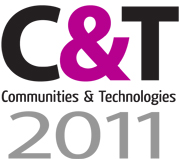Tanya Notley: Visualising Information for Advocacy (Sydney, 30 Nov 2010)
Making Links and the QUT Urban Informatics Research Lab present Dr Tanya Notley, Tactical Technology Collective (and QUT iCi PhD graduate), in conjunction with the Participatory Design Conference PDC 2010 at UTS in Sydney:
Visualising Information for Advocacy
Tuesday 30 November. Half Day Tutorial (Morning)
Presenter: Dr Tanya Notley, Tactical Technology Collective
http://www.pdc2010.org/programme/tutorials/#Tutorial4
http://www.facebook.com/event.php?eid=128689197186692
So you’ve got great data. Now what? Tactical Technology Collective are an NGO that helps rights advocates make sense of data, focus its use on their issue, and produce clear, compelling and accurate visualisations than can strengthen their campaigning. In this tutorial we’ll consider the process involved in analysing and then visualising information in collaboration with communities, organisations, researchers and other potential change makers so that it will resonate with the hearts and minds of a specific target audience. This workshop does not require you to have design skills: it will be an enjoyable, hand-on session that will focus on learning a transferable, participatory approach to conceptualise creative campaigns that visualise data and information. Creative campaigning examples from around the world will also be shared, decoded and discussed and the participants will take away copies of Tactical Tech’s guides, Visualising Information for Advocacy and Tactics for Turning Information into Action.
This tutorial will be of interest to social change designers, researchers, rights advocates and anyone else interested in turning information about an issue into action that can address it.
Registration: http://www.pdc2010.org/registration/
About the trainer:
Dr Tanya Notley is the Info-Activism Programme Lead with Tactical Technology Collective. Tactical Tech is an international NGO working at the point where rights advocacy meets information management and technology. Tanya has 15 years experience working with on media advocacy with research institutes, international development agencies and community-based organisations in Australia, the UK, Nepal, India and Sri Lanka. Tanya has produced training manuals and book chapters on radio production, digital storytelling, info-activism and participatory research methods and has delivered many workshops around the world on these topics.


